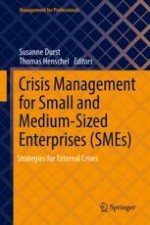2022 | OriginalPaper | Chapter
Crisis Management and Leadership: A Search for Competencies in SMEs
Authors : Marina Järvis, Karin Reinhold
Published in: Crisis Management for Small and Medium-Sized Enterprises (SMEs)
Publisher: Springer International Publishing
Activate our intelligent search to find suitable subject content or patents.
Select sections of text to find matching patents with Artificial Intelligence. powered by
Select sections of text to find additional relevant content using AI-assisted search. powered by
